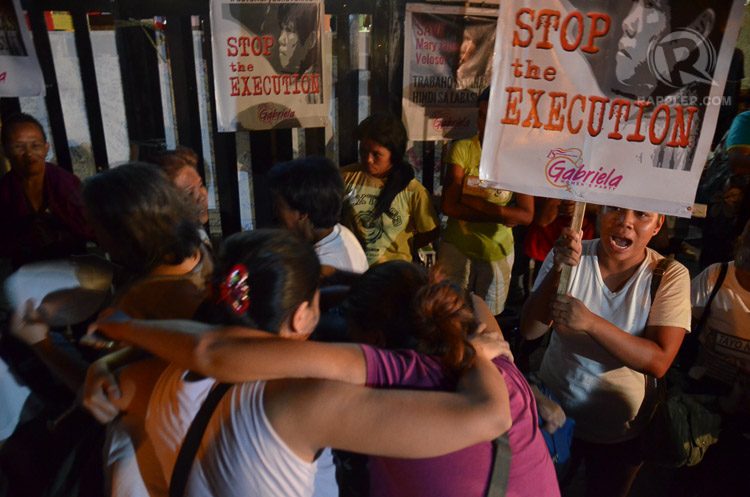SUMMARY
This is AI generated summarization, which may have errors. For context, always refer to the full article.

Filpinos rejoiced after Mary Jane Veloso was spared from execution in Indonesia, and then laughed at national newspapers which got their headlines wrong.
Veloso, sentenced to death in Indonesia for drug smuggling, was scheduled to be executed by firing squad early morning Wednesday, April 29.
Indonesia proceeded to execute 8 death row prisoners but spared Veloso at the last minute. Veloso maintained she did not know about the heroin found in her suitcase.
Filipinos around the world signed online petitions, joined street protests, and participated in night vigils. They woke up to learn about the positive development as well as to read morning papers with wrong headlines.
Facebook teemed with posts ridiculing newspapers’ front pages. Inquirer’s banner headline read: “Death came before dawn.” Manila Bulletin had: “No delay in execution.” Abante Tonite said: “Paalam Mary Jane (Goodbye, Mary Jane).”
Philippine Star and Manila Bulletin managed to update their headlines in their latest editions.
Many social media users were harsh in their criticisms, describing reporters as stupid or sleeping on their jobs.
This post is not to defend newspapers, not even the Inquirer, where I worked as reporter for six years (although I know for a fact that the Inquirer reporter assigned to monitor the Department of Foreign Affairs briefing was literally not sleeping — she was doing her job as late as 3 am).

But this is a good time, I think, for some reflection on what is happening to journalism. This incident, it seems, is about three issues:
1. This shows the changing expectations of news consumers. Having been socialized into real-time reporting they find online, news consumers appear to expect the same speed from their newspapers. This is, of course, an unreasonable expectation, given the nature of the newspaper medium.
Newspaper issues have to be ready between 9 pm and 10 pm to allow sufficient time for printing and delivery, which are not quick processes.
Newspapers have to reach newsstands early the following morning, as very few buyers wait for a specific paper: Being late means losing out to competition (of course, the case is different when it comes to the subscription market).
From what I know, updates in the past have been made successfully until about 1am, but only for editions distributed within Metro Manila, where the time between printing and distribution is much shorter. But most readers don’t realize this.
They also don’t realize that reporters, whose bylines appear with stories, do not write their own headlines. This is why we need media literacy.
2. Given the changing expectations of news consumers, newspapers should reassess their roles. The nature of the medium limits its capability when it comes to breaking news. Newspapers cannot, and perhaps should no longer, strive to break news all the time.
We have online platforms for that. Freed from this expectation, newspapers can channel their strengths into other forms of journalism, where they can remain strong.
3. Finally, against this backdrop of changing expectations and changing roles, newspapers should also remain true to the traditional standards that guide journalism, at whatever platform.
While it is true that newspapers face time constraints, it does not give them an excuse to predict spot news. It does not free them from reporting events as they are.
When something has not happened, and there is no certainty as to what would happen next, that’s what should be in the story. And by story, I also mean the headline.
Today’s social media attack on newspapers, I think, is undeserved and uninformed.
But it informs us about how readers’ expectations are changing.
Such information, if used properly, can hopefully also spare newspapers from their projected demise. – Rappler.com
This piece was originally published on Edson Is Online.
Edson Tandoc Jr is an assistant professor at the Nanyang Technological University in Singapore. He was also a Fulbright Scholar.
Add a comment
How does this make you feel?
There are no comments yet. Add your comment to start the conversation.